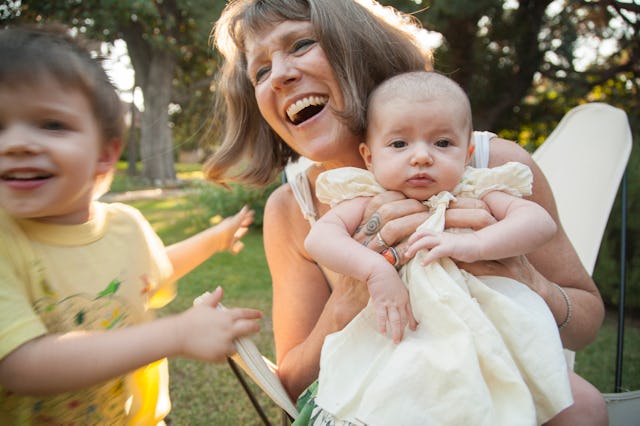Sweden Is Now Offering Paid Leave To Grandparents Helping With Grandkids
Fifty years after becoming the first country in the world to offer paternity leave, Sweden is raising the bar.

In my first year of motherhood, one of many surprises was how often I wished for my own mother. I wanted her guidance, I wanted her to share in my joy, I wanted the comfort of her voice, I wanted to hand the damn baby to a warm body so I could shower. My mom would have happily been there for all of it, but it just wasn’t an option. Like many of us, she had to work.
Thanks to groundbreaking new legislation, families in Sweden have more options than ever. Fifty years ago Sweden became the first country to offer paid paternity leave, and as of July 1st, paid time off is extended to grandparents as well.
Currently, parents in Sweden are guaranteed 480 days (about 16 months) of paid parental leave. Parents choose how to distribute the leave, with fathers averaging 130 days (27%) of leave. Swedish parents are also entitled to reduced work hours for a child’s first 8 years.
The new law gives parents the option to transfer some of their paid leave to any adult they choose, opening the door for aunts, uncles, godparents or grandparents to provide infant care. A couple can transfer 45 days of their paid leave to a third party, and a single parent can transfer up to 90 days. Proponents of the policy believe in its potential to increase parental support, strengthen family bonds, and allow an easier transition back to work.
Sweden’s progressive social policies contrast starkly with the United States. The 1993 Family Leave and Medical Act (FMLA) guarantees 12 weeks unpaid leave to eligible employees following the birth of a child, but Americans are not guaranteed any form of paid parental leave. Among industrialized nations, the U.S. remains the only country failing to offer parental leave.
Even in the best conditions — paid leave, a committed partnership, help from grandparents — birthing and caring for an infant is physically, emotionally and mentally taxing. The startling inadequacy of FMLA only becomes more insulting in a Post-Roe society where forced pregnancy has somehow gained more legal traction than attempts to improve parental leave.
Studies show that paid leave improves the health of parents and babies. Hopefully Sweden’s latest expansion to parental leave adds to the mountain of evidence inspiring the rest of the world to follow suit.